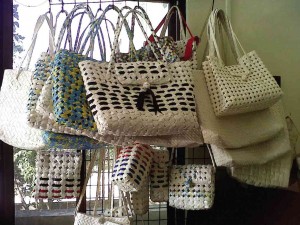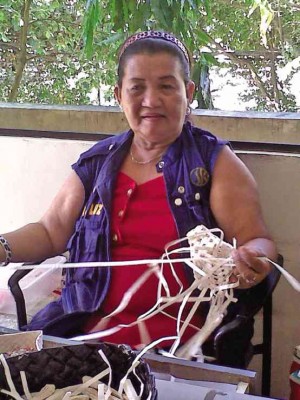Cebu village folk convert trash into cash

BAGS made from woven tetra packs by the women of Barangay Luz are sold at P150 to P200 each. Doris C. Bongcac/CDN
CEBU CITY, Philippines—From old magazines and newspapers into fashion accessories, baskets and even rosary beads.
Purita Doba has indeed mastered the art of converting neighborhood waste into useful items since 2002 when the 60-year-old woman joined the “Kwarta sa Basura” program in Barangay (village) Luz in Cebu City.
Doba is also one of the trainers in the village livelihood program, which has so far helped over 100 unemployed residents. “If you work hard, you can buy rice for your family,” she said.
Doba receives P60 to P150 for each item she produces from trash. She also gets P4,000 a month in honorarium for working as an administrative staff member and one of five livelihood program trainers.
Business area
Luz is a densely populated village near Cebu Business Park and Cebu IT Park. Because of the presence of several big businesses in its territory, it is one of the richest villages with a yearly income of P15 million.
In 2002, village officials started implementing a recycling program called “Kwarta sa Basura” in compliance with Republic Act No. 9003 or the Solid Waste Management Act. They aimed to reduce by at least 25 percent the volume of garbage being brought to a sanitary landfill in the city’s Barangay Inayawan, while providing livelihood opportunities, especially to unemployed mothers.
During the program’s first two years, the participants were told to bring their recyclable materials to the barangay hall grounds on Saturdays so these could be sold to a junk shop, said a village councilor, Ronilio Sab-a, who heads the local solid waste, environment and social services committee.
Earnings in bank
Proceeds from the sales were deposited to their bank accounts, which village officials opened for them. The money may be withdrawn only after six months, Sab-a said.
In 2004, mothers were organized and taught how to make bags, hats, and wine and pen holders from Tetra Pak cartons and packing tape, and rosaries, necklaces and bracelets from small paper strips dipped in acrylic emulsion.
For its solid waste program, Luz won a Galing Pook Award in 2009, a private initiative to promote innovation and excellence in local governance, to recognize best local government practices, and to facilitate their adoption in communities.
Even children and the elderly in the village have been tapped to help produce paper strips and other materials, especially when bulk orders are made. Each gets P150 for every 1,000 strips they make.
Starting this year, Sab-a said unemployed fathers would be trained to produce lampshades from old electric fans.
Since they can bring home the raw materials, the mother-beneficiaries have time to attend to their children.
Hotel display
Samples of their products are on display at the lobby of Cebu City Marriott Hotel inside Cebu Business Park and on the second floor of the barangay hall on Archbishop Reyes Avenue.
Sab-a said arrangements were being made with the management of Ayala Center Cebu for the women to put up a booth inside the mall.
Last month, three Germans and their two Filipino guides visited the display area of the barangay hall. The foreigners were looking for suppliers of items made from recycled materials for a souvenir shop they would open at Mactan Cebu International Airport in Lapu-Lapu City, Doba said.
Bulk orders
“We are happy every time we have bulk orders because that will mean additional income for us,” she said. “We keep on experimenting with the designs that will be used for our new products.”
Walk-in clients would also drop by the barangay hall to order bags for convention souvenir items. Some foreigners buy bags and hats.
The products cost between P50 and P200 each. The barangay gets P20 to P50 to recover the cost of materials, like glue and acrylic emulsion, while the remainder goes to the residents.
Doba, a mother of eight, said the livelihood program took care of her family’s needs after her husband, a carpenter, lost his overseas job in 2012.
Now, she is passing on her expertise to her children so they, too, can benefit from it.
